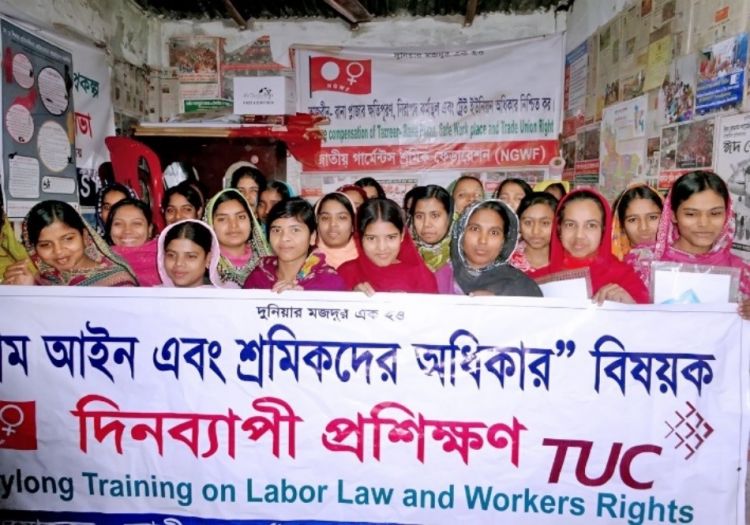Bangladesh: Women Garment Workers’ Leadership Development Project
Bangladesh: Women Garment Workers’ Leadership Development Project
Phase 1, 2014-2015
Budget: £15,000
In May 2015, the National Garment Workers Federation (NGWF) completed a set of training courses to promote women’s leadership in Bangladesh. To gauge the effectiveness of the programme, an evaluation was conducted into the programme by the Danish union federation 3F.

Key findings of the evaluation were:
- Twelve one-day training sessions about the labour law and trade union rights were run for new female members of NGWF unions, training a total of 354 women on labour law and trade union rights;
- Six three-day training sessions on collective bargaining in a union were run for female union organisers from NGWF unions, training a total of 163 female organisers on collective bargaining and organising;
- participants in training now have a better knowledge of employment rights and play a more active role in their union;
- 20 women that took part in the training have been elected to the leadership of the local unions (as President, General Secretary, Women Secretary, Sport & Culture Secretary.) One union leader said: “The training gave us a lot of courage to fight for our rights”;
- in one factory where members had been trained, women leaders have now won significant improvements in terms of maternity benefits and 18 days of leave payments; and
- in 3 factories unions are now bargaining on maternity leave/benefits and gender wage gaps – and being supported by their male union colleagues.
Based on recommendations in the evaluation report, a second phase of the project was organised and funded by TUC Aid.
Phase 2, completed 2019
Project summary
This project aimed to build a group of experienced women leaders with the National Garment Workers’ Federation (NGWF), who could lead their individual unions and eventually take positions on the executive of NGWF. In doing so, it would also increase awareness of key developments in Bangladesh labour law, and other important challenges facing the country’s trade unions. The project followed on from previous work completed in 2015 with the NGWF around organising and leadership training for women, and was supported by the Danish union 3F.
Project outcomes:
- 75 female members of NGWF affiliated unions were trained in labour laws, equal rights, leadership, health & safety and collective bargaining;
- Feedback from some of the women trained shows the impact the courses have had for them. Some women, like Renju and Fatima, reported increased confidence in dealing with management. Others have gone back to their workplaces reenergised in the task of establishing a legally recognised union on the premises, with Shamoli and Nure Jannat launching organising programmes in their factories.
- For Sema Akter, the training has given her the knowledge and confidence to tackle serious problems in her workplace. Her work has included putting a stop to endemic sexual harassment by factory supervisors and the provision of separate toilets for men and women.
- Two of the trainees, Sema and Roksana, were chosen to represent IndustriALL Bangladesh Council at a global meeting of textiles unions in Cesme, Turkey, where they were able to put their views across to representatives of ASOS, ESPRIT, H&M, Inditex and Tchibo as well as fellow trade unionists from around the world.
Follow up work:
The TUC was also awarded funds through the Ethical Trading Initiative’s DFID-supported innovation fund to support union affiliated members of IndustriALL Bangladesh Council (IBC) to help, through training, guidance and one to one support, achieve early remedy when faced with breaches of the ETI base code/ILO standards.
The Future
Bangladesh remains a very important battleground for workers’ rights. As complex textiles supply chains continue to rely on cheap labour, the work to help Bangladesh’s workers access legal protection and industrial power will continue. The ITUC has already begun moves through the International Labour Organisation to have the country investigated at the highest level for its suppression of workers’ rights. With the costly effect this would have on Bangladesh’s trade deal with the EU in particular, we should expect a strong rebuttal from the government, but also the potential for fundamental reforms if the pressure is strong enough.
Political support and solidarity will also be needed in the near future as the government completes moves to shut down the Bangladesh Accord on Fire Safety (set up in the aftermath of the Rana Plaza tragedy), in which unions played a role in transforming the health & safety landscape for workplaces linked to Western supply chains. The government will now take over responsibility for ensuring safe workplaces, but it is still ranked as one of the most hostile regimes to trade union freedoms. In 2019, strikes over minimum wages shut down the garment industry for a while, and the government responded with violence and persecution (though the demands of the strikers were also met).
For the advancement of women leaders, there remains the frustration of a very slow turnover at the top of the major union federations. To secure jobs at the very top, women are being forced to set up splinter federations, further fragmenting an already complicated union scene. But the training provided is clearly boosting the numbers of women occupying positions on federation executives, and taking charge of factory level unions, and is slowly helping the country’s unions become genuinely representative.
Stay Updated
Want to hear about our latest news and blogs?
Sign up now to get it straight to your inbox

